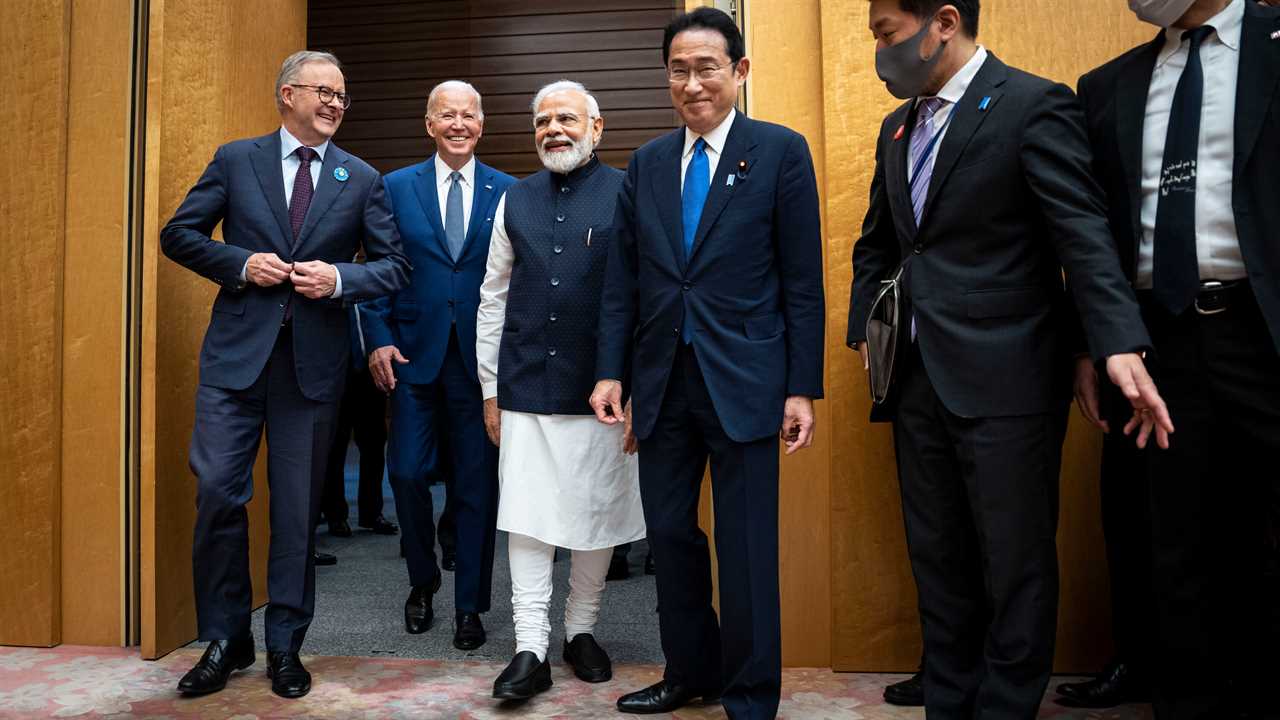
TOKYO — Even before President Biden traveled to Tokyo this week to strengthen a partnership with Australia, India and Japan, the alliance was struggling to present a united front, as India refrained from condemning Russia’s invasion of Ukraine.Now, with remarks that President Biden made about Taiwan on Monday, the Indo-Pacific bloc is facing another, unexpected complication. On the eve of a summit of the four nations, Mr. Biden said he would defend the democratic island militarily if it were invaded by China, sending shock waves around the globe and placing the allies in a tricky position.On Tuesday in Tokyo, Mr. Biden sought to temper his comments. Standing alongside the three other leaders of the grouping known as the Quad, he said his administration had not abandoned the “strategic ambiguity” over Taiwan long embraced by the United States. Asked if he would send in troops if China attacked Taiwan, Mr. Biden said, “The policy has not changed at all.”ImagePresident Biden at a news conference in Tokyo on Monday.Credit...Doug Mills/The New York TimesStill, his comments the day before, when he answered “yes” after being asked by a reporter if he “was willing to get involved militarily to defend Taiwan,” left political leaders around the world trying to determine his true thinking and calibrate their own positions.Mr. Biden’s remarks presented an immediate and probably unwanted challenge for Australia’s new prime minister, Anthony Albanese. Just hours after he was sworn in on Monday, Mr. Albanese flew to Tokyo with his new foreign minister, Penny Wong, who had harshly criticized her party’s election opponents during the campaign for suggesting that Australia would follow the United States into any war over Taiwan.“Amping up the prospect of war against a superpower is the most dangerous election tactic in Australian history,” Ms. Wong said at the time.Before the election, analysts had expected Mr. Albanese, if he became prime minister, to shift the government’s tone toward China, even if he did not make any major policy changes. Australia’s previous prime minister, Scott Morrison, often spoke about the Chinese government with belligerence as relations hit a decades-long nadir.While Mr. Albanese was on his way to Tokyo, China’s premier, Li Keqiang, offered a message of congratulations, ending an almost three-year-long freeze in diplomacy between Australia and China with a call for “sound and stable” relations. Chinese state media said the meeting of the Quad, which it has called an anti-China alliance, would be viewed as an immediate test of Mr. Albanese’s “political wisdom.”Now, raising questions once more about whether Australia would support a military defense of Taiwan could throw off whatever détente might be emerging. It also might shift the focus from subjects Mr. Albanese’s government would rather emphasize: greater ambition on climate change and increased aid and diplomatic engagement with countries in Southeast Asia and the Pacific islands.Mr. Albanese and his administration would prefer “cautious, incremental change” on China, said James Curran, a historian at the University of Sydney. At the same time, he added: “They will not want to be seen easing up the pressure in terms of our policy on China.”ImagePresident Joe Biden during a meeting with Prime Minister Anthony Albanese of Australia at the Akasaka Palace in Tokyo on Tuesday.Credit...Doug Mills/The New York TimesJapan, too, was put in a complicated position. With Japan’s westernmost inhabited island just 65 miles from Taiwan, a war with China could pull a nation that has disavowed armed conflict into dangerous territory.The Japanese government is moving toward a large increase in defense spending as it confronts China’s growing ambitions in the region, and it has discussed plans to acquire weapons capable of striking missile launch sites in enemy territory.But in contrast to Mr. Biden’s declaration on Monday, Prime Minister Fumio Kishida of Japan made an effort to maintain ambiguity when asked about Taiwan. “Our two countries’ basic position on Taiwan remains unchanged,” Mr. Kishida said.While some hawks in Mr. Kishida’s governing Liberal Democratic Party said they were pleased that Mr. Biden had revealed his “true intentions,” more cautious voices expressed concern that the president could heighten tensions with China and accelerate an arms race.Still, as the Quad leaders met on Tuesday, they sought to play up consensus where they could. The bloc announced new initiatives on cybersecurity, space, vaccine distribution and a data-sharing partnership to monitor shipping routes in the South China Sea, an effort to combat what the administration has described as aggressive maritime tactics by China in the region.ImagePresident Joe Biden with Prime Minister FumioBy: Zolan Kanno-Youngs
Title: Biden’s Words on Taiwan Leave Allies in an Awkward Spot
Sourced From: www.nytimes.com/2022/05/24/world/asia/biden-taiwan-china-australia.html
Published Date: Tue, 24 May 2022 12:09:42 +0000
Read More
Did you miss our previous article...
https://badpoliticians.com/us-politics/these-trumpendorsed-candidates-are-on-the-ballot-today
 UK PoliticsWorld PoliticsVideosPrivacy PolicyTerms And Conditions
UK PoliticsWorld PoliticsVideosPrivacy PolicyTerms And Conditions
